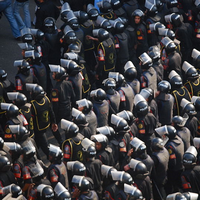Latest Archive
Free Newsletter
The collapse of negotiations toward a peaceful departure from power by Yemeni President Ali Abdullah Saleh has resulted in a week of such chaotic violence it may well appear the nation is devolving back into civil war. But close observers say that what’s occurring in Yemen now is simply a continuation of the tactics that have kept Saleh in power since the 1970s. “He wants to provoke a military confrontation with any of the opposition groups, because he feels more comfortable with armed conflict than he does confronting a nonviolent, headless movement,” says Bernard Haykel, a professor of Near Eastern […]
Chinese Premier Wen Jiabao recently made an official state visit to Malaysia. In an email interview, Shee Poon Kim, a visiting professor in the Department of Global Politics and Economics at Tamkang University in Taiwan, discussed China-Malaysia relations. WPR: What is the recent history of China-Malaysia relations? Shee Poon Kim: On May 31, 1974, Malaysia became the first of the five founding ASEAN member states to establish formal diplomatic relations with China. Over the past 37 years, Malaysian relations with China have evolved from mutual hostility (1949-1970) to détente and political accommodation (1970-1981), to economic cooperation alongside political and security […]

Thailand’s call for the repatriation of more than 140,000 refugees from Myanmar is likely aimed at enhancing investment opportunities in the politically isolated country. Bangkok’s insistence that the refugees, who live in nine camps along Thailand’s western border, had become a burden came shortly after a report indicated that China had overtaken Thailand as Myanmar’s leading investor. On Feb. 21, Myanmar’s Weekly Eleven newspaper carried figures released by a Myanmar trade group showing that more than $3 billion in new investment from November 2010 to January 2011 had brought China’s cumulative investment since 1988 to $9.6 billion — slightly higher […]

In March, the Stimson Center released a report (.pdf) by Gordon Adams and Rebecca Williams reviewing U.S. security assistance programs. Titled “A New Way Forward,” the report argued that the United States should restructure its security assistance programs away from “security,” as defined in Cold War terms, and toward “governance,” which more accurately reflects U.S. interests in the post-War on Terror world. The difference is hardly trivial. “Security” assistance focuses on improving the tactical and operational capabilities of fielded armed forces, whether against domestic or international foes, while “governance” assistance aims to “strengthen state capacity in failing, fragile, collapsing and […]
